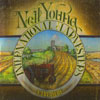NEIL YOUNG & THE INTERNATIONAL HARVESTERS : A TREASURE
- Amber Jean
- Are You Ready for the Country?
- It Might Have Been
- Bound for Glory
- Let Your Fingers Do the Walking
- Flying on the Ground Is Wrong
- Motor City
- Soul of a Woman
- Get Back to the Country
- Southern Pacific
- Nothing Is Perfect
- Grey Riders
Label : Reprise Records
Release Year : 2011
Length : 52:42
Review (AllMusic) : Volume 9 of Neil Young's long-delayed, suddenly prodigious Archives series, A Treasure chronicles Neil's 1984-1985 tour with the International Harvesters, a crackerjack assemblage of country pros featuring guitarist Ben Keith, pianist Hargus "Pig" Robbins, fiddler Rufus Thibodeaux, and Spooner Oldham. This is one of Young's famous left turns, as he abandoned the tightly wound electro of Trans and the hipster rockabilly of Everybody's Rockin' for a trip back to the country, cutting Old Ways then hitting the road with the International Harvesters. Old Ways was a little stilted but the same can't be said of A Treasure: this is vivid and alive, pulsating with a palpable joy. Their energy boosts the Old Ways material, giving it welcome blood and muscle, but A Treasure runs far broader than that one album. Young overhauls two cuts from Re*Ac*Tor, turning "Motor City" and "Southern Pacific" into a honky tonk stomp and a chugging country ballad, respectively, reworks Buffalo Springfield's "Flying on the Ground Is Wrong," ../covers Joe London's country chestnut "It Might Have Been" and, most significantly for the hardcore, there are five unreleased Young originals here: a sweetly rambling ode to his daughter "Amber Jean," an excellent slice of Texan honky tonk with "Let Your Fingers Do the Walking," the rowdy barroom blues of "Soul of a Woman," the working man protest of "Nothing Is Perfect," and Crazy Horse stomp "Grey Riders." The unheard tunes are all first-rate, but what's really notable about A Treasure is that it offers a compelling document of how good the International Harvesters were and, in turn, makes sense of a somewhat murky period for Neil Young.
